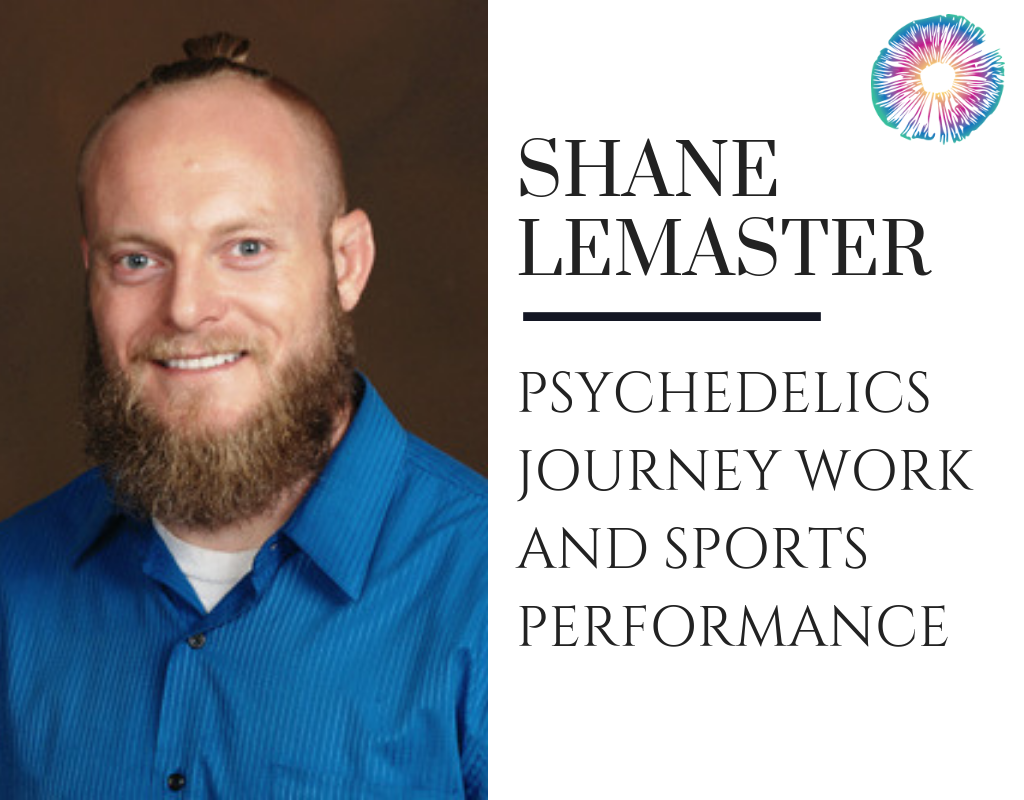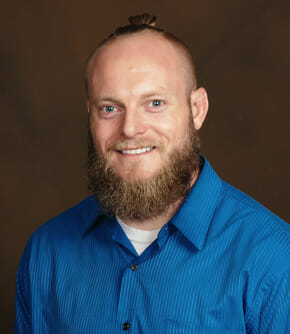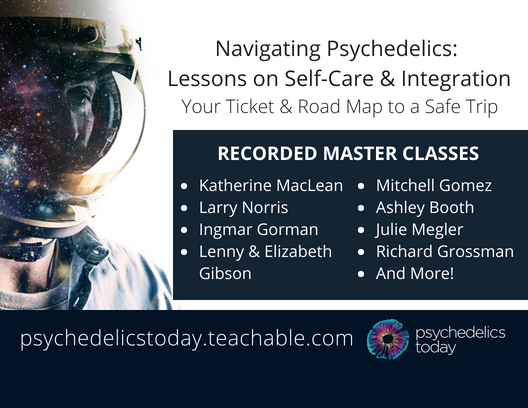
In this episode of Psychedelics Today, Joe interviews Shane LeMaster, a therapist and host of the new Podcast, Conversations with the Mind. In this discussion, we cover personal journeying, changing behavioral processes, Jiu Jitsu, and where we are headed as a collective consciousness.
3 Key Points:
- Psychedelics can be a helpful tool for personal journey work.
- Each type of psychedelic works as its own tool. They are all useful in their own context and should not be compared to each other as better or worse.
- Shane has used psychedelic therapy to help rewire past imprinted constructs of his mind to learn new behaviors in his Jiu Jitsu practice and his daily life.
Support the show
- Patreon
- Leave us a review on iTunes
- Share us with your friends – favorite podcast, etc
- Join our Facebook group – Psychedelics Today group – Find the others and create community.
Navigating Psychedelics
Show Notes
Using Psychedelics for personal journey work
- How we can enhance growth using these substances.
Big journey work sessions bring large insights
- “Recently, I’ve been working on softening my hard edges”
- Construct – the scared child. Our childhood leaves imprints that effect our behavior as adults.
- Hyper-masculinity is a result of repressing past issues.
Are there different messages after a journey in ketamine versus peyote?
- Substances produce a different feeling as if there is an “other” or “entity” that sends the messages where with breathwork it’s more of a self realization
- Drug chauvanism “my drug is better than your drug”
- “Is LSD worse than mushrooms for spiritual development? Or breathwork? We can’t say yes or no definitively.” -Joe
- Stan Grof – “why would you do breathwork if you have LSD?”
- “There is something special about the group work process in breathwork, that deeper sense of connection is hugely valuable.” -Joe
- Some substances are better when done alone in some circumstances, and substances used in a community setting as better for different circumstances. We have a choice in which tool
- “You can’t build a house with just a hammer. If LSD is a hammer and ketamine is a saw, you can’t say a hammer is better than a saw, they are both essential.”
Ketamine in Fort Collins, CO
- Dr. Scott Shannon
Shane
- Therapist, making great changes but small changes, looking to make a greater impact through social work, helping people to better themselves.
- Interest in mindfulness, positivity interventions, helping people see their power to fix their own issues
The changing landscape of how we understand consciousness
- DMT vape pens
- Make it more convenient for the consumer
- Democratizes the experience, knocks down barriers to be able to have a profound experience
- Podcasts – creating conversation about a shift in consciousness
- Elon Musk – our intelligence is heightened through proper use of the cell phone
- Stan Grof – technology of the sacred (ex. Breathwork)
- Tim Leary – “hedonic engineering” – how to live a maximally more pleasurable life
- Positive psychology meets wearable technology – developing the steps to the most enjoyable life
- Tim Ferris twitter feed – “Creation is a better means of self expression than possession, it is through creating not possessing that life is revealed.”
- “Be a creative force in the universe, it feels so good to create, and bring something to fruition, and share it with everybody, not to possess it.” -Shane
Conversations with the mind – Shane’s podcast
- “One mind having a conversation with another mind. Two minds interacting, sharing knowledge, sharing distress, sharing solution, and adding the sum of the two parts coming together, and sharing it with the collective mind.” – Shane on the purpose behind his podcast
- Guests on the show
- How psychedelics help in jiu jitsu
- PhD credential people
- PTSD patients
Advice from Stan Grof
- 30-60 days without alcohol is needed before using Breathwork for therapy when treating alcoholism
Analogy – default brain behavior
- like sledding down a hill, we always choose the same route. With psychedelics, it helps us see a new route. You stand up, and for the first time, you look up and take a 360 degree turn and see so many new routes that you have the choice to take.
- Analogy used to reprocesses trauma, brings new options to think about the experience differently
- Microdosing helps bring out new patterns of behavior to learn new skills
- “In wrestling, the last place you want to be is on your back, that’s when you get pinned, that’s when you lose a match. In jiu jitsu, being in your back is a good place to be, because there’s a lot of options from there. So I had to unlearn the fear of being on my back. It’s all about retraining my neural pathways, retraining my thinking.” -Shane
Jiu Jitsu
- It’s been said, earning a black belt is as much time and effort as earning a PhD
- The transferable skills of Jiu Jitsu can be used in therapy, breathwork and integrating psychedelic experiences. It’s all consciousness work.
Links
- www.mind-ops.com
- Conversations with the Mind – Shane’s podcast
Check out this FREE online course, “Introduction to Psychedelics”
About Shane
 Shane earned his Bachelor of Arts Degree in Psychology from the University of Colorado in Boulder, CO, completed extensive coursework towards a Master of Arts Degree in Sport & Performance Psychology at the University of Denver, and earned his Master of Arts Degree in Sport & Exercise Psychology from Argosy University.
Shane earned his Bachelor of Arts Degree in Psychology from the University of Colorado in Boulder, CO, completed extensive coursework towards a Master of Arts Degree in Sport & Performance Psychology at the University of Denver, and earned his Master of Arts Degree in Sport & Exercise Psychology from Argosy University.
Shane is nationally certified as a Sport Psychology Consultant and a licensed mental health clinician in the state of Colorado. Having worked in community non-profit mental health since 2008, Shane has gained experience working with the entire spectrum of mental disorders and with all populations and age groups. Shane plans on attending a Ph.D program in Counseling Psychology where his interest in Resiliency, Mental Toughness, and Mindfulness Training Program Development can be explored and further developed.
He is a life-long athlete having competed at various levels in more than a dozen different sports. Because of his passion for warrior cultures of past and present, Shane has been ardently developing his own “Warriorship,” training in various forms of Martial Arts for 25 years. Shane feels that the self-discipline, the philosophy of non-violence, the innumerable mental and physical benefits, and the enjoyment that he gains from the Martial Arts is what helped drive his passion in the field of Psychology.
His personal interest in Eastern Philosophy stems from his adoption of a Buddhist lifestyle and blends well with his training in Western Psychological Science. Clients describe Shane as an out-of-the-box clinician that is easy to get along with, knowledgeable on a variety of topics, credible with lived experience, and as having the ability to make therapy fun and interesting.



